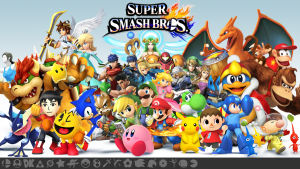Super Smash Brothers Podcast Reflection

I have been playing Super Smash Brothers Brawl with my family for several years, and I honestly cannot imagine most of my childhood without it. It is an exhilarating game that can easily bring people together both in the spirit of competition and teamwork. I found it interesting how my partner, Jasmine, and I had a very similar perspective of Super Smash Bros and its features. It was quite difficult to narrow down our options but we both ultimately agreed that this game is one of the most challenging yet exciting game on the market that we can thoroughly analyze and talk about. As we each talked about and delved into our own personal experiences with the game, we realized that we had so much to talk about when we were writing our script. We decided to give the audience a taste of the excitement the game brings by putting a twist in the beginning of our podcast through the introduction of a third character. We made it seem like a boxing match within a video game, and we also added the element of competition with the small dialogue between Jasmine and me before we further analyzed the game.
As we wrote our script, we realized that the way we say things are just as important as what we say in our podcast. We had a hard time trying to make the podcast sound unscripted, but since we had a physical script in our hand, it made it harder to make our conversations sound more natural and unforced. After we went through the whole podcast, we thought about using bullet points next time to talk about the key points we want to address but not necessarily write out our entire script. Even though we tried to accentuate certain parts of the script to make it more lively and interesting, I felt like we lacked depth in terms of game analysis. It seemed like we were marketing the game rather than studying the different aspects of the game— both good and bad.
The whole process of editing and putting together the dialogue and the music was also quite difficult. Neither of us had worked with Audacity and it was a struggle to figure out how to operate the system. We tried to do everything in one take but as we were reading off the script, we were bound to make mistakes. However, even though we faced several problems making the podcast, I was very satisfied with how it turned out. I thought that the analytical elements were lacking, but in terms of capturing the audience, I thought that we did a pretty good job. We incorporated Digital Citizenship and utilize technology to engage in electronic environments and online spaces. We also received insight on how collaboration can be used to elevate how we deliver our message. We learned that a conversation between two people is oftentimes more intriguing than one person solely talking about the game. Jasmine and I brainstormed and added to one another’s knowledge of the game, which not only broadened the audience’s perception about the game but also our own.
I thoroughly enjoyed making this podcast. Every step of the process and the project as a whole taught me so much about how to take our knowledge of a game and lay it out on a table for an audience to hear. I’ve never even listened to any podcasts until I took this course, but I found a new way to carry out information and explore literature in a unique, meaningful and fun way.

